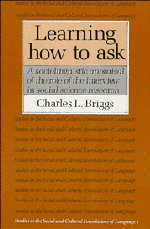
-
Select format
-
- Publisher:
- Cambridge University Press
- Publication date:
- 05 June 2012
- 25 July 1986
- ISBN:
- 9781139165990
- 9780521311137
- Dimensions:
- Weight & Pages:
- Dimensions:
- (228 x 152 mm)
- Weight & Pages:
- 0.243kg, 176 Pages
You may already have access via personal or institutional login
Book description
Interviews are ubiquitous in modern society, and they play a crucial role in social scientific research. But, as Charles Briggs convincingly argues in this book, received interviewing techniques rest on fundamental misapprehensions about the nature both of the interview as a communicative event, and of the nature of the data that it produces. Furthermore, interviewers rarely examine the compatibility of interviews as a means of acquiring information to one another. These oversights often blind interviewers to ensuing errors of interpretation, as well as to the limitations of the interview as a means of acquiring data. To conflict these problems, Professor Briggs presents an analysis of the 'communicative blunders' that he himself committed in conducting research interviews among Spanish-speakers in northern New Mexico. By focusing on these errors and exploring how they may be avoided, he is able to propose new techniques for designing, implementing, and analyzing interview-based research. These rest on identifying the subjects' resources for conveying information, and the relative compatability of the shared rules and understandings that underlie their strategies with those associated with interviews. Critical of existing paradigms of interviewing, which he sees as deriving from Western 'folk' theories of reality and communication, Briggs shows that the development of more sophisticated interviewing methodologies requires further research into interviewing itself. Briggs's conclusions provide a basis for the reexamination of current uses of interviews in a wide range of contexts - from social science research to job applications, welfare and health care delivery, criminal and legal investigations, journalism and broadcasting, and other areas of everyday life. His book will appeal to linguists, sociologists, anthropologists, historians, psychologists, as well as other readers whose research or professional activities depend on the use of interviews.
Reviews
‘More than any other recent work of a self-proclaimed hermeneutic/phenomenological ‘reflexive’ or self-reflective nature, Learning How to Ask avoids both the merely autobiographical, and the negative and unproductively relativistic form of critique of the fieldwork enterprise. Rather, it applies the tools of speech event analysis that have emerged from the cumulative formulations of a number of traditions of research and teaches us ‘how to ask’ with a new, sophisticated level of understanding. An argument about methodological refinement, it is at the same time a theoretical contribution to the linguistic anthropology of a foundational speech event in social science.’
Michael Silverstein - University of Chicago
‘I would call this book ‘brilliant’ if the word were not so overused. Briggs’s work is ethnography at its best, both critical and constructive. He is critically alert to the ways in which modes of inquiry condition what the fieldworker finds, and constructive in showing a way to arrive at grounded understanding.’
Dell H. Hymes - University of Pennsylvania
Contents
Metrics
Altmetric attention score
Full text views
Full text views help Loading metrics...
Loading metrics...
* Views captured on Cambridge Core between #date#. This data will be updated every 24 hours.
Usage data cannot currently be displayed.
Accessibility standard: Unknown
Why this information is here
This section outlines the accessibility features of this content - including support for screen readers, full keyboard navigation and high-contrast display options. This may not be relevant for you.
Accessibility Information
Accessibility compliance for the PDF of this book is currently unknown and may be updated in the future.


